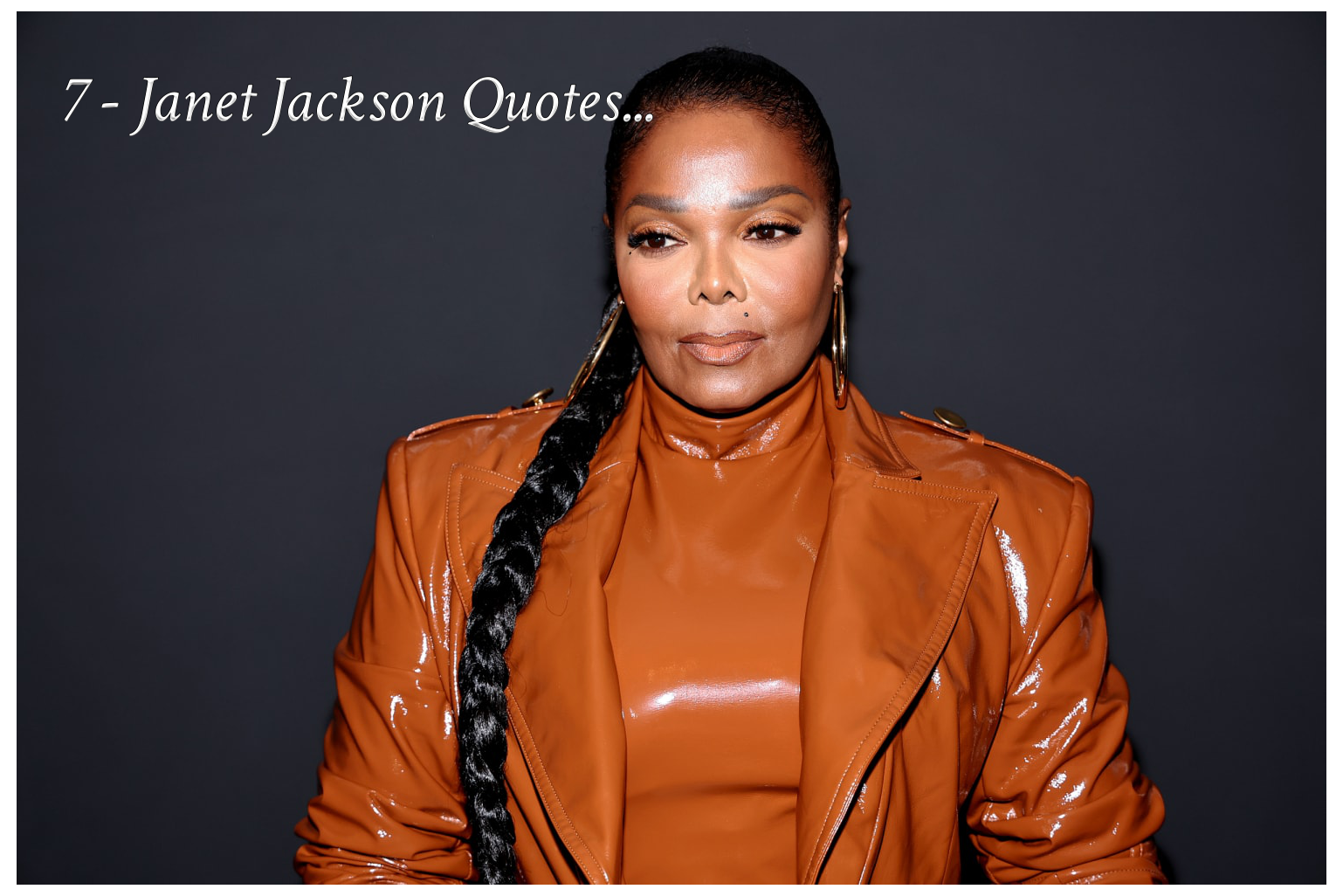(ThyBlackMan.com) Janet Jackson is more than a pop icon — she is a cultural historian in motion, a mirror to generations of social change and emotional evolution. Across her career, her words have often been as impactful as her music. They capture the struggles and triumphs of identity, love, faith, and self-acceptance — themes that continue to resonate deeply in our modern era. Each of these quotes carries a fragment of her journey, reflecting lessons that remain profoundly relevant today.

1. “You don’t have to hold onto the pain to hold onto the memory.”
This statement captures one of the most powerful aspects of emotional maturity — the ability to remember without reliving. Janet’s words point toward the process of healing, the delicate balance between remembrance and release. Pain can be an anchor, but she reminds us that memory doesn’t have to be weighted by suffering. This idea echoes through psychology and cultural thought, emphasizing how people must move from trauma toward restoration. Her wisdom invites reflection on how we curate our pasts — what we choose to keep and what we allow to fade.
In the digital age, where public and private pain often coexist on social media, Janet’s insight feels revolutionary. People today document everything — heartbreaks, losses, failures — and in doing so, they sometimes re-traumatize themselves. The act of sharing can be cathartic, but it can also become a loop, trapping individuals in cycles of sorrow. Janet’s reminder challenges that impulse: letting go isn’t erasing history; it’s reclaiming peace. It is a gentle encouragement to engage with the past not as a wound but as a lesson. One can still honor the past without being imprisoned by it, just as one can love a song without needing to relive the heartbreak that inspired it.
Historically, this idea parallels the broader Black experience of transformation — a community that has endured immense pain while preserving joy, creativity, and resilience. Across centuries, African Americans have had to turn pain into power — from spirituals sung under oppression to soul music born from struggle. Janet, as part of a legacy family that turned generational hardship into artistic triumph, understands that remembrance can be a form of liberation. Her quote speaks to that lineage of emotional intelligence — to keep the wisdom of the past, not its wounds, and to transform collective trauma into creation. It’s the very essence of survival through artistry.
Ultimately, this line is about choosing freedom — the kind of internal emancipation that allows growth without guilt. Memory, when unburdened by pain, becomes wisdom. Janet’s insight encourages us to archive experiences not to relive suffering but to celebrate survival. In a world that constantly urges people to “move on,” she offers something more meaningful: move forward, but take your lessons with you. It’s a soft yet firm command to evolve — to honor what was, without allowing it to dictate what will be.
2. “It is my belief that we all have the need to feel special. It is this need that can bring out the best in us, yet the worst in us.”
Here, Janet explores the double-edged sword of human nature — the desire for validation. This quote speaks to a timeless truth: the same longing that inspires greatness can also breed jealousy, ego, or insecurity. Her words resonate deeply in a culture where recognition has become currency. The drive to be seen, appreciated, and acknowledged is ancient, yet in our hyperconnected era, it has evolved into a public performance of worth. Janet’s quote becomes a mirror — reflecting how easily we can lose ourselves when we mistake attention for affection.
Historically, this sentiment mirrors the evolution of fame itself. In Janet’s early career, being “special” came from excellence — mastering one’s craft, earning respect through talent and discipline. But as entertainment transformed into an economy of visibility, specialness became tied to exposure. Today, a viral post can create an illusion of significance, but it often fades faster than the applause. Her observation, spoken decades ago, now reads like prophecy. She understood that the pursuit of feeling special, if untethered from purpose, can distort one’s sense of self and values. The desire for validation can push people toward brilliance — or break them entirely.
Psychologically, the need to feel special is universal and deeply human. It motivates creation, leadership, and discovery. But as Janet suggests, it must be rooted in authenticity, not ego. When our sense of worth relies on external approval, it becomes fragile, constantly needing replenishment. Her insight captures that fine tension between ambition and arrogance, confidence and comparison. It’s a dynamic that has defined many public figures — some who rose above it, others who fell victim to it. Janet’s self-awareness reveals a lifelong struggle to maintain individuality within a family and industry that demanded perfection.
In today’s influencer-driven society, her quote holds urgent relevance. We live in a time where even ordinary lives are branded and marketed. People chase the illusion of being “special” through filters, followers, and metrics — often losing genuine connection in the process. Janet’s humility cuts through that noise. To her, being special is not about spotlight but substance. It’s about what you contribute, not how loudly you’re seen. The best in us seeks to inspire; the worst seeks to outshine. Her wisdom invites balance — to seek meaning rather than attention, and to understand that true uniqueness is born from truth, not performance.
3. “I kinda see everyone as competition. I’m a very competitive person. But I think that’s good. Competition is great. And as long as it’s friendly and not a malicious thing, then I think it’s cool.”
This quote gives us a glimpse into Janet’s disciplined mindset — one shaped by legacy, expectation, and excellence. Her relationship with competition was always nuanced. Coming from the Jackson family meant living within one of the most competitive artistic dynasties in history. She had to carve out her identity in a world that already knew her last name. For her, competition was not about rivalry but about evolution — a force that sharpened her skills and inspired reinvention. It kept her driven but not bitter, ambitious yet grounded.
Historically, competition has driven progress, especially in Black music. The Motown era, where Janet’s artistic lineage found its roots, thrived on creative rivalries that birthed innovation. Artists like Stevie Wonder, Diana Ross, and Marvin Gaye pushed one another to refine their craft, and that legacy flowed into the generations that followed. Janet’s career embodies that same ethos. Her performances were precision-engineered masterpieces — not to one-up her peers, but to meet the standard she set for herself. She turned competition into fuel for excellence, embodying a work ethic that balanced intensity with grace.
In modern society, however, competition often turns toxic — especially among women in entertainment. The industry, driven by comparison, has long pitted female artists against one another as a marketing tool. Janet’s perspective is the antidote to that narrative. Her statement champions the idea that competition can be empowering when it uplifts rather than divides. She understood the difference between inspiration and imitation, rivalry and resentment. This healthy competitiveness — rooted in respect — allowed her to celebrate others’ success while still pursuing her own greatness.
Culturally, her approach continues to resonate today. In corporate offices, classrooms, and creative spaces, competition can easily become corrosive if ego outweighs empathy. Janet’s philosophy — that competition is “cool” as long as it remains friendly — serves as a model for emotional intelligence in ambition. True competition, she reminds us, doesn’t seek to destroy; it sharpens. It doesn’t diminish others; it challenges everyone to rise higher. It is a call to maintain integrity even while striving for victory — a message that transcends entertainment and speaks to the human spirit’s desire for growth through grace.
4. “I would hope my legacy would be bringing smiles to faces. Happiness with my music.”
Here, Janet distills her life’s mission into something beautifully simple: joy. Amidst fame, controversy, and reinvention, she never lost sight of the purpose behind her art. This quote encapsulates her humanitarian heart, her belief that music should heal and uplift. It’s a mission rooted in empathy — to give people light even when she herself has endured darkness. For Janet, joy is not superficial; it is an act of compassion.
From a historical standpoint, this aligns with the very roots of Black musical expression — born from struggle yet filled with hope. Gospel, jazz, soul, and R&B were never merely sounds; they were survival languages. Through rhythm and voice, Black artists transformed pain into perseverance. Janet’s desire to spread happiness continues that lineage, extending it into the pop and dance worlds. Her songs, from “Escapade” to “Together Again,” reflect the unbroken thread between joy and justice — an insistence that happiness is not a privilege, but a right worth fighting for.
Janet’s statement also reveals humility and purpose. Despite her monumental success — countless awards, sold-out tours, cultural impact — she defines her legacy not by numbers but by emotion. That humility separates her from the celebrity machinery that dominates modern fame. She prioritizes feeling over fame, sincerity over spectacle. To bring happiness through music means to reach beyond performance and into people’s lives — to make them dance, reflect, or simply smile. Her art becomes not just entertainment but therapy, a form of collective healing through sound.
Today, her words carry renewed weight. The world feels heavier — burdened by anxiety, uncertainty, and loss. In such times, joy itself becomes a radical force. Janet’s pursuit of happiness through her art is not naive; it is revolutionary. Her message reminds us that music can be both escape and empowerment. By bringing smiles to faces, she fulfills the deepest purpose of artistry — to remind humanity of its shared heartbeat. Joy, as Janet teaches, is resistance, renewal, and restoration all at once.
5. “I do think kids should be kids. You have the rest of your life to be an adult.”
This quote reflects Janet’s protective nature and awareness of how society often rushes innocence. Having grown up in show business herself, she understood firsthand how childhood can be sacrificed for success. Her statement is both personal and political — a defense of youth in a culture that commodifies it. Janet’s own story gives the quote emotional weight: a young girl on stage surrounded by adults, having to perform perfection long before she could understand what adulthood truly meant. Her words are a quiet call for mercy — a reminder that every child deserves the time and space to just be.
Historically, this has been a persistent issue, especially within entertainment. Many child stars, including those from Janet’s generation, struggled under the pressures of early fame. From Judy Garland to Michael Jackson, the pattern of childhood lost to the demands of performance has been tragically common. Janet’s words reveal empathy born from experience — a warning against the adultification of children, particularly young Black children, who are often denied the grace of youth in both media and society. This denial has deep roots in American history, where innocence has not always been extended equally. By insisting that “kids should be kids,” Janet advocates for protection and patience — an act of love and defiance in a world that too often equates worth with maturity or productivity.
Culturally, this quote continues to resonate in the modern era. Social media has blurred the line between childhood and adulthood. Kids today navigate platforms that expose them to fame, criticism, and expectations far beyond their years. Influencer culture, beauty filters, and public commentary all contribute to a dangerous erosion of innocence. Janet’s reminder feels urgent — a call to parents, educators, and creators to let children imagine freely, to let them fail safely, to let them live without being molded too soon. In her statement, she reclaims the idea that childhood is sacred — not something to be accelerated, but something to be protected.
Her philosophy carries a timeless truth: maturity comes naturally. There’s no need to fast-forward innocence, no need to strip away wonder to prepare for the “real world.” By protecting childhood, society preserves creativity, curiosity, and emotional health — qualities that often fade when kids are forced into adult roles too early. Janet’s insight, though simple, challenges modern expectations that success must come young and fast. It urges us to slow down and let youth breathe. In an age obsessed with growth metrics and early achievement, her voice becomes a rare, nurturing reminder that time — especially the time to be young — is the most valuable gift of all.
6. “I am not a religious person, but I am spiritual. But I don’t believe in things like guilt.”
Janet’s statement about spirituality captures her evolution as both artist and woman. It reveals a move away from rigid dogma toward personal enlightenment — a shift reflective of broader generational change. The distinction between religion and spirituality has defined modern identity, and her view aligns with a movement toward authenticity over conformity. For Janet, faith is not about institutions or rituals; it’s about alignment with inner peace and universal compassion. Her words remind us that spirituality is not something that must be prescribed — it can be discovered.
From a historical perspective, this evolution mirrors a cultural shift that began in the late 20th century, when individuals began seeking a more personal connection to the divine. Organized religion, while still central for many, began to share space with mindfulness, meditation, and self-reflection. Janet’s spirituality fits that broader awakening — one that replaced fear-based doctrine with freedom-based belief. She belongs to a lineage of artists, thinkers, and seekers who redefined faith not as obedience, but as openness. It’s a deeply human approach — one that embraces imperfection, curiosity, and emotional truth.
Her rejection of guilt is particularly profound. Guilt, long used as a moral instrument in religious and social systems, can easily transform from conscience into chain. Janet’s refusal to carry it reflects a journey toward self-forgiveness — an act of courage for a woman who has lived her life under constant public scrutiny. Through scandals, criticism, and media narratives, she learned that peace cannot coexist with shame. Her stance reclaims power from those who weaponize guilt, asserting that accountability and guilt are not the same. To grow, one must acknowledge mistakes without being consumed by them. That’s a philosophy rooted in grace.
Today, her words feel prophetic. In a time dominated by cancel culture, moral policing, and endless judgment, Janet’s declaration challenges the belief that guilt must define identity. It speaks to an entire generation re-examining morality through empathy rather than punishment. Her spirituality, grounded in self-knowledge and compassion, offers a healing alternative: peace instead of penitence. For her, faith is not about fearing the divine but recognizing the divine within oneself. It’s about lightness — the ability to move forward, unburdened by shame. Janet’s words remind us that spiritual growth begins not with guilt, but with love.
7. “It has taken me most of my adult life to come to terms with who I am. To do that, I had to break free of attitudes that brought me down.”
This is perhaps the most revealing of Janet’s reflections — a confession and triumph all in one. Her words echo the universal human struggle toward self-acceptance. It’s a process of unlearning, of shedding external expectations and inherited insecurities. Coming from one of the most famous families in the world, Janet’s life was defined early by public gaze and private doubt. Every move she made — musical, personal, or aesthetic — was compared, dissected, or judged. For her to “come to terms” with herself required monumental strength. This quote is less about confidence and more about liberation — the slow, deliberate act of rediscovering one’s own reflection.
In historical terms, this mirrors the broader cultural shift toward self-definition, especially for women of color in the public eye. For much of her early career, Janet was expected to conform — to be polite, demure, image-perfect. Her body, voice, and choices were all subjects of commentary. But over time, she refused to let those imposed narratives define her. She began to write and perform music that reflected her truth — sensual, introspective, defiant, and free. Her evolution into self-acceptance symbolizes the breaking of societal molds that confined women, particularly Black women, to narrow archetypes. Her journey mirrors a collective awakening — one where identity became self-authored rather than externally imposed.
The phrase “break free of attitudes” resonates beyond her personal story. It speaks to generational healing — the courage to confront internalized negativity. Those attitudes might come from family expectations, cultural stereotypes, or internal fear. For Janet, breaking free was both artistic and spiritual. She dismantled not only the limiting beliefs of others but also the ones she had unknowingly inherited. This kind of liberation is slow and sometimes painful, but it’s transformative. It teaches that freedom begins in the mind — in the decision to stop apologizing for existing as oneself.
In modern society, where identity is both celebrated and commodified, Janet’s truth feels grounding. Self-acceptance isn’t instant; it’s a lifelong practice. Her quote serves as an anthem for liberation — a reminder that becoming oneself is not rebellion but return. Her life shows that peace doesn’t come from perfection, but from authenticity. She turned her self-discovery into art, allowing her fans to see not just the superstar, but the human being behind the music. In doing so, she gave others permission to embrace their own complexity — to live honestly, imperfectly, and fully. Janet’s words linger like a closing note to a lifetime symphony: you are allowed to become who you are, at your own pace, and without apology.
Across these seven quotes, Janet Jackson emerges not just as a performer, but as a philosopher of modern life. Her reflections span emotional healing, ambition, spirituality, and identity — themes that mirror the evolution of culture itself. They invite readers to rethink what legacy truly means: not fame, but understanding; not perfection, but peace.
Her wisdom, born of experience and introspection, remains strikingly relevant. In an era defined by noise, Janet’s voice still carries clarity. Through her words, she continues to teach that growth is not about control — it’s about release, empathy, and joy.

















Leave a Reply